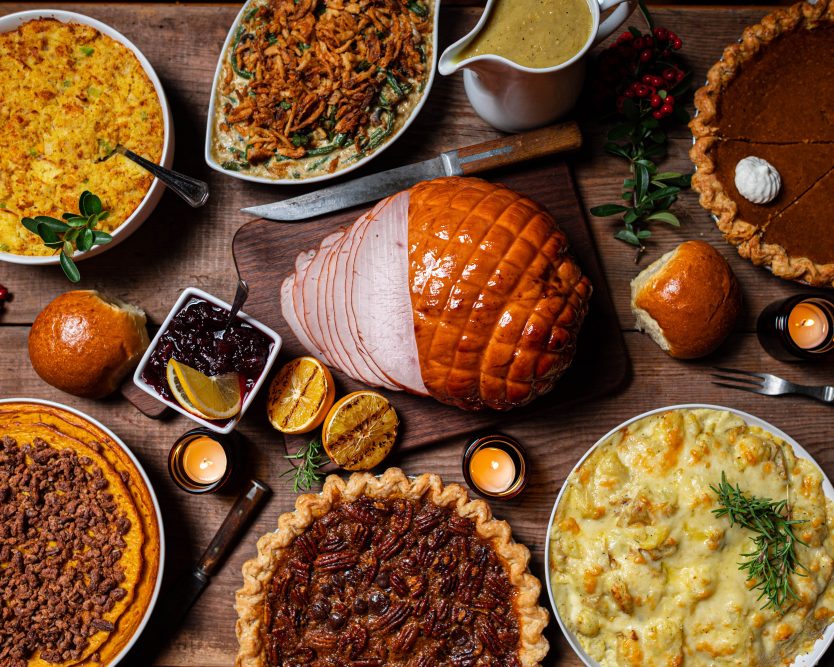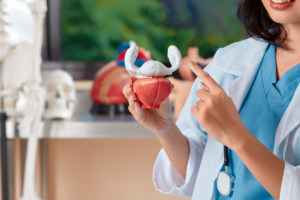As women, we are often critical of ourselves and our bodies, wishing we were thinner, more shapely, taller or shorter.
When holidays arrive that include delicious meals, we feel we need to limit our intake to protect our figures. Or we overeat and then beat ourselves up for indulging.
Even if you focus on eating healthy most of the time, or you’re following a meal plan that might fall apart during the holidays, it’s still important to enjoy Thanksgiving and the festive season that follows soon after.
So here’s why it’s okay to enjoy your Thanksgiving dinner, and some ideas on how to do it.
Don’t Obsess About the Meal
There are plenty of other positive aspects to Thanksgiving, so make a point of enjoying those too. It may be gathering with friends or family, spending a day volunteering, or simply savoring a day off from work and some time alone.
An informal poll by the reading site Goodreads showed that 45% of respondents chose “family getting together and being family” as their favorite part of Thanksgiving. “Feasting” was third at 18%, so it’s still worth enjoying a good meal.1 And worrying too much about what you’re eating can become a problem.
The Journal of the American Medical Association, for instance, reports that inpatient stays for eating disorders rose during the pandemic. There were aspects of the pandemic that would (not surprisingly) intensify eating disorders for those who are susceptible.2
But it’s worth noting that for those suffering from a disorder, Thanksgiving and other food-focused gatherings can be even more difficult. If you suspect you have an eating disorder, don’t suffer in silence—seek medical care.
It’s Okay to Take a Day Off
Even those on the strictest meal plan can afford a day off once in a while. In fact, what has become known as “cheat meals” may in fact help your overall weight loss goals.3
Some research has shown that your body may increase its metabolism and burn calories faster after a cheat meal. Some Psychologists and nutritionists speculate that a cheat meal allows those on a highly restrictive, low-calorie diet to eat better throughout the week.3
But there are some guidelines. First, don’t think of Thanksgiving dinner as cheating! Think of it as a meal you have earned and should enjoy.3 Drop the guilt and be sure to cherish the delicious food, as well as time at the table with loved ones.
Add Healthy Side Dishes
If you’re responsible for the meal, or you’ve been asked to bring a side dish, add health benefits to your dinner by incorporating a fall vegetable into the meal. Pumpkins, even in a pie, provide health benefits, containing beta-carotene, vitamin A, and Vitamin C.4
Beets are another option for a Thanksgiving side dish. They don’t have to be hot either. If you’re in charge of a salad, consider one with roasted beets, which pair well with goat cheese and walnuts for a delicious fall treat. Beets provide antioxidant and anti-inflammatory properties, are high in fiber and nitrates, and are an excellent source of potassium.5
You can also offer to contribute a guilt-free dessert, like coconut vanilla macaroons.
Plan Ahead
Whether you’re on a diet or not, being uncomfortable after overeating can spoil a good meal by affecting how you feel after. So by taking a few steps before and during the meal, you can still enjoy your Thanksgiving dinner without suffering from a food coma, upset stomach, or difficulty sleeping at the end of the big day.
Here are a few easy to follow tips:6
- Eat breakfast that day, so you aren’t starving by meal time.
- Mind your portions, choosing those dishes you love the most if you feel you need to eliminate some options.
- Don’t take seconds.
- Indulge in dessert (you deserve it!).
- Savor your meal, eating mindfully, and putting your fork down between bites.
- Watch your alcohol intake, which can stimulate your appetite and lower your inhibitions.
Forgive Yourself
Be easy on yourself if you do indulge in a big meal. One bad meal does not make you a “failure.”3
Be kind to yourself. Read a good book, go for a walk outside, do some yoga, or start something new like journaling. Cherish the memories of the meal together with family or friends. Be grateful that you have the ability to eat delicious and nutritious food. Accept what you ate, and move on.
If you find you’re overeating on a regular basis, however, there can be long-term health consequences. Then it’s worth making changes to your lifestyle.
Your Doctor Can Help
If you’re interested in nutrition, then a dietician or your doctor can provide you with advice. Use our Physician Finder to find a doctor near you who specializes in women’s health and can provide you with the information you need for all your health concerns.
















